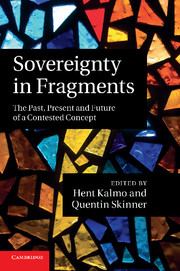Book contents
- Frontmatter
- Contents
- Notes on contributors
- Acknowledgements
- Introduction: a concept in fragments
- 1 The sovereign state: a genealogy
- 2 The apparition of sovereignty
- 3 The Westphalian myth and the idea of external sovereignty
- 4 Double binds: sovereignty and the just war tradition
- 5 The durability of organized hypocrisy
- 6 A matter of fact? The many faces of sovereignty
- 7 The survival of sovereignty
- 8 Sovereignty and after
- 9 Prolegomena to the post-sovereign Rechtsstaat
- 10 Sovereignty beyond the state
- 11 Sovereignty between government, exception and governance
- 12 Conclusion: vocabularies of sovereignty – powers of a paradox
- Bibliography
- Index
4 - Double binds: sovereignty and the just war tradition
Published online by Cambridge University Press: 04 February 2011
- Frontmatter
- Contents
- Notes on contributors
- Acknowledgements
- Introduction: a concept in fragments
- 1 The sovereign state: a genealogy
- 2 The apparition of sovereignty
- 3 The Westphalian myth and the idea of external sovereignty
- 4 Double binds: sovereignty and the just war tradition
- 5 The durability of organized hypocrisy
- 6 A matter of fact? The many faces of sovereignty
- 7 The survival of sovereignty
- 8 Sovereignty and after
- 9 Prolegomena to the post-sovereign Rechtsstaat
- 10 Sovereignty beyond the state
- 11 Sovereignty between government, exception and governance
- 12 Conclusion: vocabularies of sovereignty – powers of a paradox
- Bibliography
- Index
Summary
In order for a war to be justifiable, or so we learn from most books on the subject, it must be waged by a legitimate authority. For a long time, the most obvious locus of that authority has been the sovereign state, and to the extent that international institutions could ever claim to possess such authority, this was by virtue of prior agreements among the former. But as has been pointed out, this basic equation of legitimate authority with state sovereignty is problematic, since it implies that there cannot be any legitimate authority over and above that of states. In the absence of any such overarching authority, it becomes hard to see how the doctrine of just war could be anything more than an instrument of state interest, by providing a convenient way of demonizing the opponent in times of war. As one critic has remarked, ‘in a world of sovereign states, a formula whose righteousness is in the eyes of the beholder is surely fatally flawed’.
This basic difficulty has been with us at least since Grotius, but has been further aggravated by the recent emergence of new kinds of warfare and the rise of new actors. Many of the wars being fought today cannot easily be classified as either international or domestic in character, simply because most of them are both simultaneously. Many of those wars also involve non-state combatants, such as terrorist networks and private security firms.
- Type
- Chapter
- Information
- Sovereignty in FragmentsThe Past, Present and Future of a Contested Concept, pp. 81 - 95Publisher: Cambridge University PressPrint publication year: 2010
- 4
- Cited by



